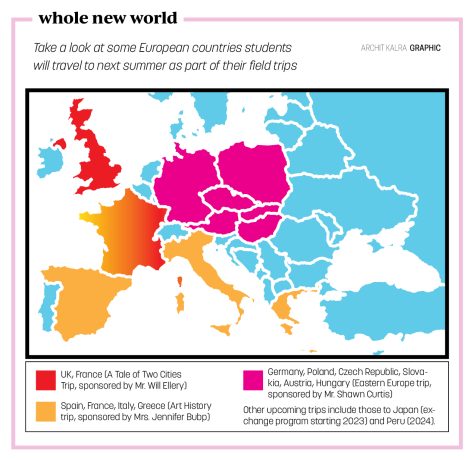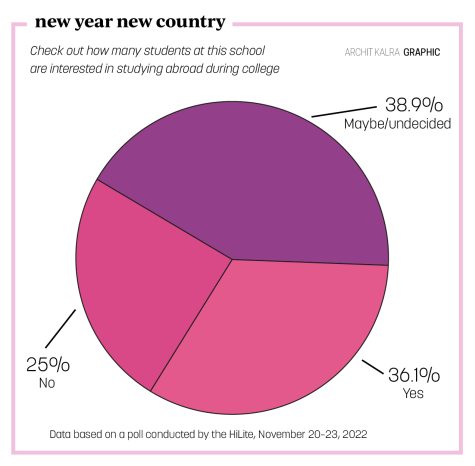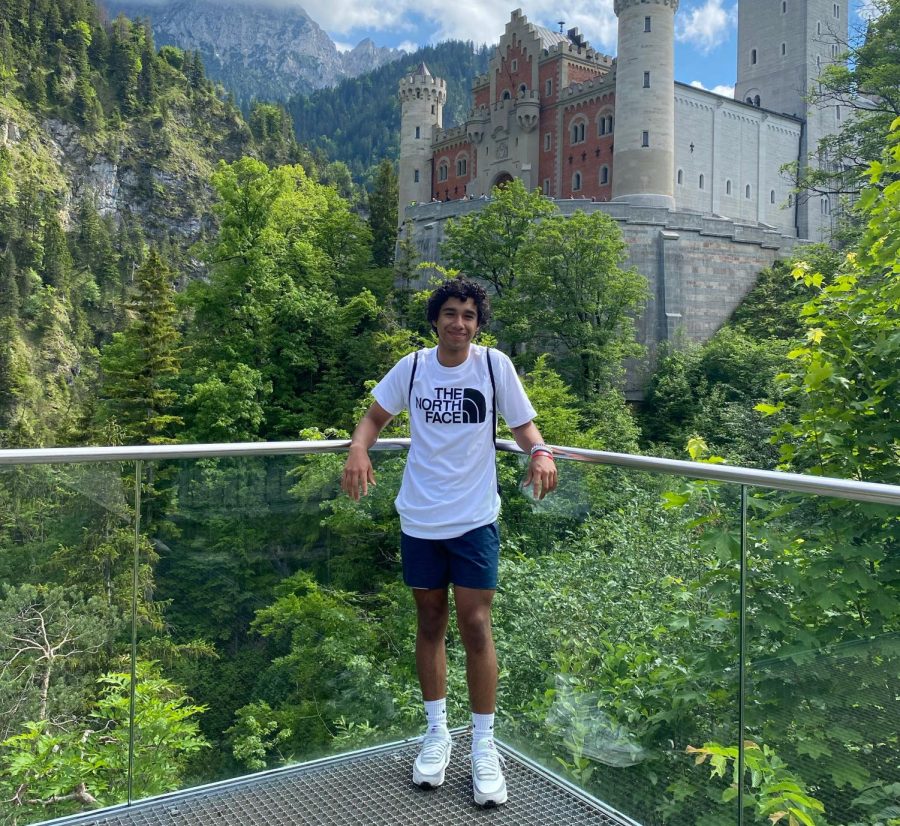For senior Bryan Rivas, visiting the island of Capri, Italy was an awe-inspiring experience.
“We rode a gondola to the top of the island, where it seemed like you were on top of the world,” Rivas said. “Being in the clouds, I had a feeling (none) other (than) pure joy where you could grasp how amazing it really is to be in such a beautiful place.”
Rivas was one of 20 students at this school to join a field trip to central Europe last summer, where he toured Germany, Austria, Italy and the Vatican. He said the trip allowed him to build on what he had been learning in school and learn about European history and culture firsthand.
“The way I see (it), school is (where) we go to learn, and this trip taught me a lot of things I had never even considered (about the things I’d been learning at school),” Rivas said.
Rivas is not alone. According to WorldStrides, an educational travel organization, over 400,000 students, parents and teachers have traveled through their programs since the pandemic. At this school, there are three trips to Europe planned for June 2023 alone, and more scheduled for Japan, Costa Rica, Peru and other countries in the coming months and years.
IB History teacher Will Ellery, who led the trip Rivas went on last summer and will lead the “A Tale of Two Cities” trip to London and Paris this June, said international trips help students embrace both academics and culture at the same time.
“It really is the best academic experience because kids (get to) walk where history is made,” Ellery said. “They can see the art they’ve always seen in books, they can taste the food they’ve always heard about. The cultural immersion is pretty intense.”
Sophomore Gracie Tan, who will go on the art history trip to Spain, France, Italy and Greece this June, said she agreed.
“This trip connects a lot with what we’re learning in class because our material includes many famous artworks that we will get to see in person on this trip and I think being able to physically see what we’ve been learning about throughout the year is going to be a very unique experience,” she said.

In addition to giving students an immersive learning opportunity, Ellery said international trips are especially useful because they let students connect with new people.
“The biggest part of it, the most important value, is that they get to understand that people are people everywhere,” he said. “People have the same drives, the same goals, people are nice everywhere. So they get the opportunity to see the world and the world becomes a bit smaller.”
In particular for Rivas, this opportunity to see the world included a chance to visit the Vatican and connect more deeply with his Catholic beliefs.
“Being in such a holy and sacred place meant a lot to me,” he said, “(especially because) we got to crawl the Holy Stairs, the same stairs Jesus crawled before crucifixion. It is life-altering to be able to do this kind of thing and see how amazing the world really is.”
Social studies teacher Shawn Curtis, who is leading a trip to Eastern Europe this June, said these trips can help dispel misconceptions and stereotypes about different countries as well.
“I think a lot of people have preconceived notions of Eastern Europe based on history and the Cold War, kind of an East-West separation. I think it’ll be interesting for people to get a new perspective on it and see the ‘Old World’ beauty of it,” he said.
“(When you’re going on these trips) you’re not removed, you’re not like looking in a zoo, you’re going into the place,” Curtis said. “And I love it. And as a history teacher, I would probably say the same of all the history trips that are going: history teachers love hands-on stuff. To learn history, you have to touch history.”
In this vein, Curtis noted how he will also be taking his students to see historical sites with more grim environments, such as the Auschwitz and Birkenau concentration camps from the Holocaust.
“I think it’s important in terms of the Holocaust that people get a tactile understanding of it,” he said. “There’s going to be definite murky feelings about this, about learning through observing, and the silence and the seeing. But just the idea of having visited a concentration camp, I think it becomes really hard not to understand the Holocaust. You get to experience at least the after-effect.”

Ellery said he agreed and will take a similar trip when showing his students the Normandy American Cemetery at the site of the D-Day fighting in World War II.
“When we have been in (places like concentration camps and American cemeteries), the full weight of history hits kids—in a good way, in a powerful way, in a moving way, in a memorable way,” he said. “You can see kids literally brought to their knees sometimes, looking at a grave and realizing (that) this father and son are buried side by side in Normandy, or walking in a concentration camp sometimes.”
“It’s like you’re walking with ghosts, everybody’s silent there, your steps kind of echo,” Ellery added. “So those experiences really amplify kids’ understanding of what it means to be part of this global culture.”
According to Tan, this philosophy of a global culture and historic understanding may push her to study abroad in college. She shares this sentiment with many other students: based on a poll conducted by the HiLite, 75% of students at this school said they are considering studying abroad for at least a semester after they graduate high school.
Curtis said he encourages his students to study abroad if they can.
“I hope even if they don’t study abroad, (taking an international trip) makes them globally sensitive and understanding that there are a lot of people in the world, and there’s a lot of people who do things differently than we do, and it’s important that we all understand each other and find those connective points,” Curtis said. “(Whether) it’s for global diplomacy, or the future of the human race.”
Overall, Rivas said his experiences on the trip to Europe influenced him to study with a more global outlook.
“Being able to see such amazing places definitely motivated me to experience what the world has to offer,” he said. “It motivated me to definitely go out of state for college. Although going out of state isn’t studying in a new country, it is still a step toward exploring new places. (The Europe trip) motivated me to work harder and, with that hard work, anything is possible.”

































![AI in films like "The Brutalist" is convenient, but shouldn’t take priority [opinion]](https://hilite.org/wp-content/uploads/2025/02/catherine-cover-1200x471.jpg)










































![Review: “The Immortal Soul Salvage Yard:” A criminally underrated poetry collection [MUSE]](https://hilite.org/wp-content/uploads/2025/03/71cju6TvqmL._AC_UF10001000_QL80_.jpg)
![Review: "Dog Man" is Unapologetically Chaotic [MUSE]](https://hilite.org/wp-content/uploads/2025/03/dogman-1200x700.jpg)
![Review: "Ne Zha 2": The WeChat family reunion I didn’t know I needed [MUSE]](https://hilite.org/wp-content/uploads/2025/03/unnamed-4.png)
![Review in Print: Maripaz Villar brings a delightfully unique style to the world of WEBTOON [MUSE]](https://hilite.org/wp-content/uploads/2023/12/maripazcover-1200x960.jpg)
![Review: “The Sword of Kaigen” is a masterpiece [MUSE]](https://hilite.org/wp-content/uploads/2023/11/Screenshot-2023-11-26-201051.png)
![Review: Gateron Oil Kings, great linear switches, okay price [MUSE]](https://hilite.org/wp-content/uploads/2023/11/Screenshot-2023-11-26-200553.png)
![Review: “A Haunting in Venice” is a significant improvement from other Agatha Christie adaptations [MUSE]](https://hilite.org/wp-content/uploads/2023/11/e7ee2938a6d422669771bce6d8088521.jpg)
![Review: A Thanksgiving story from elementary school, still just as interesting [MUSE]](https://hilite.org/wp-content/uploads/2023/11/Screenshot-2023-11-26-195514-987x1200.png)
![Review: "When I Fly Towards You", cute, uplifting youth drama [MUSE]](https://hilite.org/wp-content/uploads/2023/09/When-I-Fly-Towards-You-Chinese-drama.png)
![Postcards from Muse: Hawaii Travel Diary [MUSE]](https://hilite.org/wp-content/uploads/2023/09/My-project-1-1200x1200.jpg)
![Review: "Ladybug & Cat Noir: The Movie," departure from original show [MUSE]](https://hilite.org/wp-content/uploads/2023/09/Ladybug__Cat_Noir_-_The_Movie_poster.jpg)
![Review in Print: "Hidden Love" is the cute, uplifting drama everyone needs [MUSE]](https://hilite.org/wp-content/uploads/2023/09/hiddenlovecover-e1693597208225-1030x1200.png)
![Review in Print: "Heartstopper" is the heartwarming queer romance we all need [MUSE]](https://hilite.org/wp-content/uploads/2023/08/museheartstoppercover-1200x654.png)




